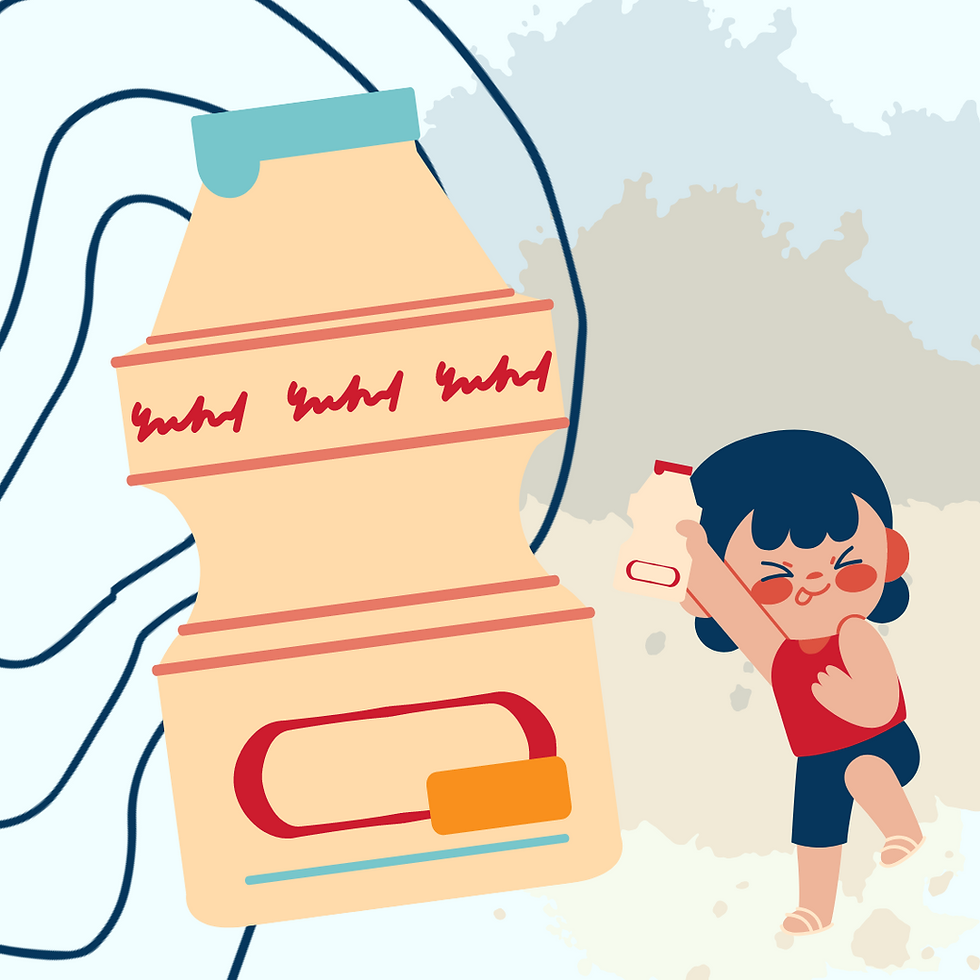Ingredients from Sriracha
- traceorgan
- Mar 21, 2022
- 7 min read
Updated: Sep 2, 2022

Ingredients: Chilli, Sugar, Salt, Garlic, Acetic Acid, Potassium Sorbate, Sodium Bisulfite, Xanthan Gum*
Chilli
Purpose
Chilli peppers are added to create the spicy flavour of Sriracha.
Health Benefits
Chilli peppers contain capsaicin, which may promote weight loss by increasing the burn rate of fat and reducing appetite, therefore decreasing calorie intake (1). They also contain lutein (mostly in immature chilli peppers), a vitamin that decreases maturation and improves eye health (1). They are also rich in Vitamin C, B6, K1, A, and potassium. Vitamin C and A help the immune system and other bodily functions work properly (1). Vitamin B6 helps with nervous and immune system function and is required for processes containing carbohydrates, fats and proteins (2). Vitamin K1 helps maintain kidney health, bone health, and blood clots (1). Potassium aids in the regulation of fluid balance and other chemical reactions in the body (3).
Potential Health Risks
High consumption of chilli peppers may temporarily desensitize pain receptors over time (1). The spicy flavour will no longer feel spicy as the body will be used to it, leading to increased consumption, and therefore further health risks (1). Chilli peppers can cause stomach pain, cramps, a burning sensation in your guts, or diarrhea as well (1).
Recommendation
Eat-in moderation. Chilli can be used as a spice for your food regularly and at a moderated amount, but should not be used by those with digestive issues (1).
Sugar
Purpose
Sugar is used to make the sriracha mildly sweet.
Health Benefits
Sugar is energy for the human body, and it is considered crucial for the body (4). The body stores excess energy to be used when needed throughout the day (4).
Potential Health Risks
Eating excess amounts of sugar contributes to cardiovascular diseases, diabetes, obesity, and high blood pressure, which can weaken heart muscles and lead to heart failure (5). It can also result in narrowed or damaged arteries that can lead to internal bleeding (aneurysms), stroke, and kidney failure as it can damage blood vessels that prevent kidney function (5). As the liver turns carbohydrates into fats, too much sugar can lead to fat build-up in the liver (4).
Recommendation
The daily recommended intake of added sugars is approximately not more than 25 grams for women and 37.5 grams for men (6). It is better to consume less sugar and get daily energy needs from more complex carbohydrates like whole grains.
Salt
Purpose
Salt is added to sriracha to add flavour.
Health Benefits
Salt plays many important roles in the body, from muscle function to nerve transmission (7).
Potential Health Risks
Consuming too much salt can lead to high blood pressure, which then creates the risk of aneurysms (ballooning of blood), possibly leading to life-threatening internal bleeding (8). Overconsumption can also result in kidney failure by damaging blood vessels, and thereby hurting kidney function and leading to a build-up of water and waste in the body (8). Sexual dysfunction, stroke, heart attack and failure, kidney failure/disease, and vision loss are all other complications that can result from high blood pressure (9).
Recommendation
The amount of salt present in sriracha should cause no significant health problems. It is recommended to have 1.5 grams for adults and 1 gram for children (8). Try not to go over 2.3 grams of salt as recommended by the American Heart Association (10).
Garlic
Purpose
Garlic is used in sriracha for flavour.
Health Benefits
Garlic can help combat high blood pressure by turning the sulphur into hydrogen sulphide gas to expand the arteries and make blood flow easier, therefore improving cardiovascular health (11). It can also kill bacteria that cause acne (not recommended when open wounds are present) and prevent food poisoning (11).
Potential Health Risks
Too much garlic can lead to an upset stomach, bloating, diarrhea, and bad breath (12).
Recommendation
The recommended daily amount of garlic is 2-4 cloves, according to the University of Maryland Medical Center (13).
Acetic Acid
Purpose
Acetic acid is used to enhance a sour taste in sriracha, extend shelf-life, and maintain the pH of the product with its acidic properties (14).
Health Benefits
Acetic acid is known to kill bacteria by altering the chemical structure of fats and proteins (15). It can also reduce blood pressure by decreasing levels of renin, an enzyme produced by the kidneys to control blood pressure (16). Additionally, it can decrease inflammatory response in mice by lowering the levels of small secreted proteins called cytokines (16, 17). A reduction of long-term inflammation is important as there is evidence connecting chronic inflammation to ailments such as heart disease and cancer (16).
Potential Health Risks
Though acetic acid is a weak acid, meaning it does not separate as much as stronger acids when added to another substance, it is still categorized as corrosive (18). High levels of ingestion may lead to acute corrosion of the mouth and digestive tract, as well as lead to skin irritation, vomiting and diarrhea (18). The long-term daily consumption of products with acetic acids, such as vinegar, can cause hypoglycemia or a sharp drop in blood sugar levels (19).
Recommendation
It is recommended to dilute vinegar using one cup of water for every 1-2 tablespoons in order to lessen its acid strength (16). When using certain types of vinegar for medicinal purposes, it is recommended to seek advice from a doctor first (16).
Potassium Sorbate
Purpose
Potassium sorbate is a tasteless synthetically made salt of sorbic acid, which is often utilized as a preservative in foods by restricting the growth of mold, fungi, and other bacterias (20, 21).
Health Benefits
Potassium sorbate is beneficial because it kills bacteria in a variety of foods that we eat, including processed meats, dairy products, bread and baked goods (21). The use of this additive in these foods can ensure that its consumers do not become sick from spoiled food (21). For example, evidence has shown that potassium sorbate has helped neutralize salmonella bacteria in ground beef jerky (21).
Potential Health Risks
Although there are a few studies that have shown that it does have the ability to damage the DNA of our white blood cells on a small scale, allergies caused by the ingestion of food containing potassium sorbate are rare due to its statistically insignificant risk (22, 23, 24).
Recommendation
The maximum daily intake of potassium sorbate is about 25 milligrams per kilogram of body weight (22).
Sodium bisulphite
Purpose
Sodium bisulphite is used as a preservative in sriracha (25).
Health Benefits
Sodium bisulphite prevents the growth of bacteria and fungi (25). There are little to no benefits of this ingredient.
Potential Health Risks
In general, sulphites aggravate asthma (26). Some individuals with asthma need to avoid all sulphites as they can be life-threatening (27).
Recommendation
Although there is no specific recommended amount of sodium bisulphite everyone should consume, people with medical conditions, including asthma, should consult with their medical advisors before consuming this ingredient.
Xanthan Gum
Purpose
Xanthan gum is used to thicken sriracha (28). Xanthan gum is made when sugar is fermented with a specific kind of bacteria called Xanthomonas campestris (29).
Health Benefits
Xanthan gum helps stimulate the intestine to push food through it due to its swelling (28). Moreover, it may help decrease the absorption of sugars in the digestive system because it slows the amount of sugar that is absorbed into the bloodstream by turning itself into a gel-like substance (29).
Potential Health Risks
Taking more than 15 grams of xanthan gum can lead to digestive issues, increased gas, and altered gut bacteria (29).
Recommendation
Regulations make this ingredient safe for consumers to eat. It is very unlikely for people to experience significant negative or positive health effects from xanthan gum in food products. However, it is recommended to not consume more than 15 grams of xanthan gum per day in order to avoid the discussed health risks (29).
Overview: Good Flavor Enhancer and Low in sodium
Sriracha can be used to add some spiciness to your food. It is not necessarily unhealthy to consume this sauce; however, there are not many health benefits associated with its consumption. Although there is no recommended daily intake, you should avoid overconsumption as it contains a significant amount of salt. Though it has less sodium than other condiments, so it can be a good flavour enhancer for those needing to watch salt intake. Because sriracha contains sodium bisulphite, those with asthma are also not advised to eat it. Those with other medical conditions should consult with their healthcare provider.
References
Arnarson, A. (2019, May 13). Chili Peppers 101: Nutrition Facts and Health Effects. Healthline. https://www.healthline.com/nutrition/foods/chili-peppers.
Brazier, Y. (2020, December 17). The benefits and food sources of vitamin B6. Medical News Today. https://www.medicalnewstoday.com/articles/219662#health-benefits.
Raman, R. (2017, September 9). What Does Potassium Do for Your Body? A Detailed Review. Healthline. https://www.healthline.com/nutrition/what-does-potassium-do.
The Sweet Danger of Sugar. Harvard Health Publishing. (2019, November 5). www.health.harvard.edu/heart-health/the-sweet-danger-of-sugar.
Sissons, B. (2021, March 29). Does the body need sugar? Role in the body and how much to consume. Medical News Today. https://www.medicalnewstoday.com/articles/does-your-body-need-sugar.
Gunnars, Kris. (2018, June 28). Daily Intake of Sugar - How Much Sugar Should You Eat Per Day? Healthline. www.healthline.com/nutrition/how-much-sugar-per-day.
Palsdottir, H. (2017, June 18). Salt: Good or Bad? Healthline. www.healthline.com/nutrition/salt-good-or-bad.
Palsdottir, H. (2017, June 18) Salt: Good or Bad? Healthline. www.healthline.com/nutrition/salt-good-or-bad.
Mayo Clinic Staff. (2019, November 19). High blood pressure dangers: Hypertension’s effects on your body. Mayo Clinic. https://www.mayoclinic.org/diseases-conditions/high-blood-pressure/in-depth/high-blood-pressure/art-20045868.
American Heart Association. (2018, May 23). How Much Sodium Should I Eat per Day? heart.org. www.heart.org/en/healthy-living/healthy-eating/eat-smart/sodium/how-much-sodium-should-i-eat-per-day.
6 Surprising Ways Garlic Boosts Your Health. Cleveland Clinic. (2020, December 7). https://health.clevelandclinic.org/6-surprising-ways-garlic-boosts-your-health/.
Garlic. National Center for Complementary and Integrative Health. (n.d.). www.nccih.nih.gov/health/garlic.
Coila, B. (2019, December 5). Recommended Dose of Raw Garlic in the Diet. LEAFtv. www.leaf.tv/6618534/recommended-dose-of-raw-garlic-in-the-diet/.
Food Additive ‘Acetic Acid’. Mitsubishi Chemical Corporation. (n.d.). www.m-chemical.co.jp/en/products/departments/mcc/emulsifier/product/1206180_8006.html.
Evangeli, A., & Tong, A. (2018, January 18). Does Vinegar Really Kill Household Germs? ABC News. www.abc.net.au/news/health/2018-01-12/does-vinegar-really-kill-household-germs/8806878.
Link, R. (2019, June 3). Acetic Acid: A Powerful Compound in Vinegar with Health Benefits. Dr. Axe. www.draxe.com/nutrition/acetic-acid/.
Yang, H., Meng, L., Ai, D., Hou, N., Li, H., Shuai, X., & Peng, X. (2019). Acetic acid alleviates the inflammatory response and liver injury in septic mice by increasing the expression of TRIM40. Experimental and Therapeutic Medicine. https://doi.org/10.3892/etm.2019.7274
PubChem Compound Summary for CID 176, Acetic acid. PubChem. (2021). https://pubchem.ncbi.nlm.nih.gov/compound/Acetic-acid.
Brennan, D. (2020, October 8). Vinegar: Is It Good for You? WebMD. https://www.webmd.com/diet/vinegar-good-for-you#2-5.
What Is Potassium Sorbate?. The Honest Company. (2013, May 7). www.honest.com/blog/wellness/ingredients/what-is-potassium-sorbate/4774.html.
Gardner, A. (2020, February 20). There’s Potassium Sorbate in My Food - Is That Safe? Livestrong.com. www.livestrong.com/article/353871-adverse-health-effects-of-potassium-sorbate/.
Hecht, M. (2017, March 30). Everything You Should Know about Potassium Sorbate. Healthline. www.healthline.com/health/potassium-sorbate#risks.
Potassium Sorbate - Beneficial Preservative or Harmful DNA Toxin? Fooducate. (2019, December 26). https://www.fooducate.com/community/post/Potassium-Sorbate-Beneficial-Preservative-or-Harmful-DNA-Toxin%3F/57A354F3-FFE5-EC83-4FE1-80C048942A62.
Mamur, S., Yüzbaşıoğlu, D., Ünal, F., & Yilmaz, S. (2010, April 24). Does Potassium Sorbate Induce Genotoxic or Mutagenic Effects in Lymphocytes? Toxicology in Vitro. https://pubmed.ncbi.nlm.nih.gov/20036729/.
Myers, B. (2019, September 2). Is Sodium Bisulfite Harmful to Your Health? Livestrong.com. www.livestrong.com/article/480920-is-sodium-bisulfite-harmful-to-your-health/.
5 Food Additives You Should Avoid. Cleveland Clinic. (2020, December 29). https://health.clevelandclinic.org/5-food-additives-you-should-avoid/.
Brennan, D. (2019, August 18). Asthma and Sulfites Allergies. WebMD. www.webmd.com/asthma/asthma-and-sulfites-allergies.
Xanthan Gum: Uses, Side Effects, Interactions, Dosage, and Warning. (n.d.). WebMD. www.webmd.com/vitamins/ai/ingredientmono-340/xanthan-gum.
Pullen, C. (2017, May 27). Xanthan Gum - Is This Food Additive Healthy or Harmful? Healthline. www.healthline.com/nutrition/xanthan-gum.
Credits:
Researcher: Ethan Ma, Arthur Jin, Ishivita Sharma
Reviewed by: Karen Giesbrecht (Registered Dietitian)
Editor: Tanya
Graphics: Tiffany Z
Last updated on March 21st, 2022, 4:55 PM PST/PDT
*Disclaimer: Ingredients may vary from company to company and product to product. The information included is for educational purposes only and is not intended to be a substitute for medical treatment by a healthcare professional. Because of unique individual needs, please consult a registered dietitian for nutrition recommendations that are customized for you.
.png)




Comments